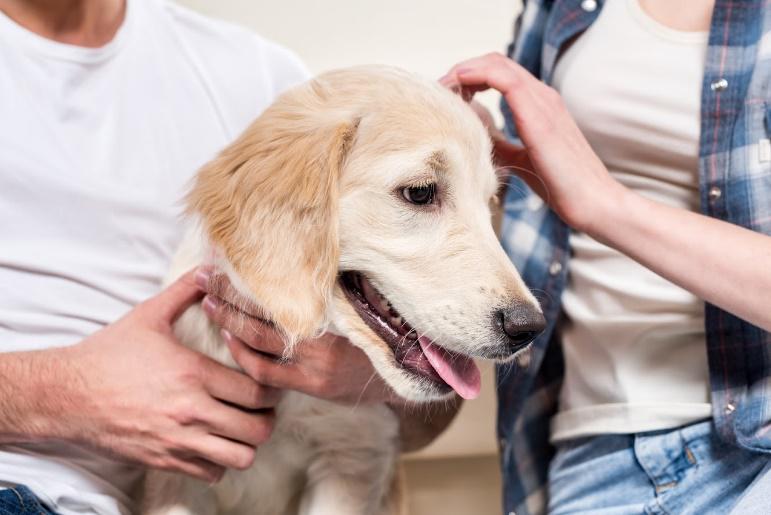If you have a new pup in your home, you may want to know when to neuter a dog. Spaying or neutering a dog is one of the best things you can do not only for your own pup but also for the general animal population. But choosing when to neuter a dog can be challenging for new dog owners.

In this blog post, we are going to go over what it means to neuter a dog, the benefits to you and your pup and the best age to neuter a dog.
Why Neuter a Dog
Neutering a dog refers to castration, which is a surgical procedure performed on your male dog under general anesthesia. Basically, your vet will remove your dog’s testes. This is actually a simpler surgery than a spay (which is done on a female dog – check out our specific blog post about that here). An incision is made near the front of the scrotum and the testes are removed through that incision.

The main reasons to neuter a dog come down to three basic categories:
Preventing unplanned puppies – When you have an unspayed female dog, she will go into “heat” one to two times per year. During this time, she will attract male dogs from all over and may end up becoming pregnant with a litter of puppies. While puppies are adorable, they are also incredibly expensive and involve a lot of time and energy on your part. Added to that, a female dog will require veterinary care before and after giving birth to the litter. These puppies would then need to find good homes, which can be very difficult. Neutering your dog will prevent these accidental puppies from coming into the world even if there is an unspayed female in the area
Reducing specific health risks – Neutering a male dog can help prevent testicular cancer and reduces the risk of a variety of other problems such as prostate disease.
Reducing behavior issues – It’s been shown that when you neuter a dog, they actually end up roaming less and they tend to stop undesirable behaviors such as leg lifting or mounting. Neutering a male dog can also help decrease aggressiveness in dogs (check out our blog post on dog aggression if you want to learn more about that)
When to Neuter A Dog
The traditional age for neutering varies depending on the breed and the physical maturity of your dog. It’s important you speak to your vet before making any decisions about when to neuter a dog, as they will be able to provide you with the best time range based on your specific pup.
Many vets recommend a puppy is neutered after going through puberty, which is generally between six to nine months for a male dog. There is some research to show that there may be long term benefits of neutering your pup after they have gone through puberty, such as a reduction in orthopedic health problems and reduce in certain cancers.

As you can see, it’s not a clear-cut answer! So, it is very important you consult with a vet before making any decisions. If you are new to having a puppy (or haven’t yet gotten your pup), make sure you check out our recent post on how to find the best vet for your new furball!
Recovery Time for Neutering a Dog
Generally, after you neuter a dog, the vet will make sure they are not in any discomfort and then send them home the same day. You will likely be given some pain medication and direction from your vet for at home care. Most vets will send you and your pup home with a protective cone to prevent your dog from licking the incision area, which can lead to infection.

Your dog will also be on limited activity for at least 7-10 days while the incision area heals. Too much activity can cause stitches to pop or the incision area to get infected. It’s recommended that you take your dog outside to relieve himself on a leash so he doesn’t get too crazy and start trying to chase squirrels!
You may also return to the vet for a follow up after a week or two so the vet can check out how your pup is doing and if he needs to have the stitches removed.
Tips for Helping Your Dog
Follow the advice and direction provided by your vet when you bring your pup home. You can also do the following things to make your dog as comfortable as possible:
Provide him with a quiet place to recover indoors and away from any other pets in the home
Stop him from jumping up on the couch or bed for a few weeks (try stairs like the ones below to help him get up and down from furniture safely)
Avoid bathing your pup for two weeks after surgery
Check the incision site daily
Give your pup fun games with treats to keep him occupied so he doesn’t get bored with little activity
Final Thoughts
While it can be tough to go through the two weeks of low activity after neutering, choosing to neuter a dog is one of the best things you can do for your new pup. Don’t let him convince you to cut corners during the recovery time regardless of how much he wants to go outside and play!







